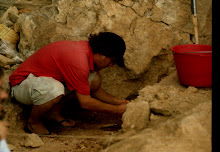- present your work in an engaging way through the use of examples or analogies your audience can relate to or use to remember what you're saying;
- develop a dialogue with your audience to understand where they're coming from and what their background on a topic is;
- try to put yourself in the shoes of someone who has no background in your field;
- relate given findings to broader issues to underscore their relevance;
- be forthcoming about potential issues with your own research; and
- write and talk in an accessible way instead of wrapping yourself in disciplinary technicality.
To me, the most significant point she makes had to do with relating scientific research to concerns outside of a narrow scientific interests, and to try to seize on issues of general interest as an anchor of sorts for your research. By doing this (one example she gives is research on overeating resonating better with people by linking it toThanksgiving), it becomes easy to underscore the significance of even minor developments and, most importantly, make people care about them. I really loved this sentence that encapsulates her general feeling:
"Science is bigger than single discoveries and if we can make people understand that, they're going to trust scientists a lot more and they're going to be a lot more interested in science."

No comments:
Post a Comment